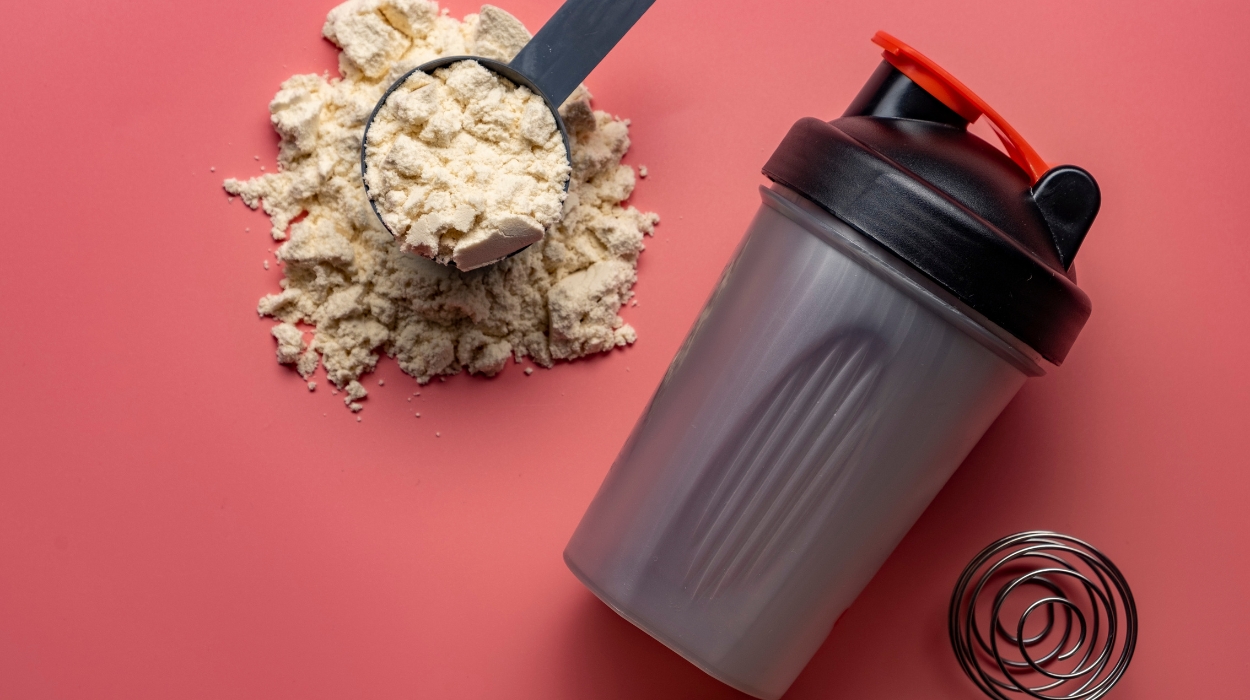 Expert's opinion
Expert's opinion
Expert's opinion
The article is a subjective view on this topic written by writers specializing in medical writing.
It may reflect on a personal journey surrounding struggles with an illness or medical condition, involve product comparisons, diet considerations, or other health-related opinions.
Although the view is entirely that of the writer, it is based on academic experiences and scientific research they have conducted; it is fact-checked by a team of degreed medical experts, and validated by sources attached to the article.
The numbers in parenthesis (1,2,3) will take you to clickable links to related scientific papers.
Is Protein Powder Good For You? Benefits, Risks & Ways To Use 2024

If you play sports or exercise a lot, you might find it difficult to get enough protein in your diet. Protein powders or protein shakes are a great way to easily increase your protein intake and gain muscle mass.
But many people worry whether protein powder is actually good for you.
In fact, not all protein powders are good for you, and some people should avoid protein powders altogether.
This article answers the question “Is protein powder good for you?” and covers the health benefits, potential risks, how much protein powder you should take, and how to choose the best one.
Are Protein Powder Supplements Good For You?
So, are protein powders healthy? A lot of the time, yes.
Protein powders have a range of science-backed benefits, including:
- Aiding weight loss.
- Increasing protein synthesis and muscle mass.
- Improving sports performance and recovery
- Reducing sarcopenia risk
- Protecting bone health
What Does Protein Powder Do?

So, what is protein powder good for, and is protein powder healthy? Here are the top 5 benefits of including protein powder as part of a healthy diet.
Aids Healthy Weight Loss
Protein is useful for weight management because it is the most filling macronutrient.[1] Ensuring you’re eating sufficient protein for your body weight improves satiety and helps control hunger levels, ultimately helping you lose weight.
Conversely, not getting enough protein can lead to weight gain due to eating too many calories from carbohydrates or fat.
One small pilot study found that women consuming protein powder in addition to aerobic exercise might lose more body fat[2] than women who exercise without consuming protein supplements.
Another study found that women who consumed a protein-rich meal replacement shake once daily increased their daily protein intake[3] and lost more weight after 12 weeks than women who only received lifestyle advice.
Improves Muscle Mass
If you’re looking to build muscle, consuming protein powders is one of the best ways to speed up muscle growth.
You need to make sure you’re consuming protein sources providing all nine essential amino acids for muscle growth. And, for optimal muscle building after exercise, you’ll need to focus on the branched-chain amino acids: L-valine, L-leucine, and L-isoleucine. These amino acids are important for muscle building and recovery.[4]
A systematic review found that ingesting protein after either endurance or resistance exercise increases the growth and repair of muscle tissue[5] and might increase muscle strength and power in the long term.
Improves Sports Performance And Recovery
Many athletes do not consume enough protein,[6] which can hinder post-exercise muscle recovery and hence future performance. In fact, until recently, scientists think protein intake has been underemphasized[7] in endurance athletes.
A small study in physically active men found that consuming protein powder might reduce the risk of post-exercise muscle soreness.[8] However, the best protein powder for men in this study was whey, not casein protein powder.
What’s more, consuming whey protein isolate powder before and after exercise might improve mitochondrial adaptations[9] in trained runners, meaning they might be able to run more efficiently, though there were no differences in physical performance after six weeks.
Reduces Sarcopenia Risk
One risk of aging is muscle wasting known as sarcopenia. This increases the risk of frailty, falls, and associated injuries, and impacts heart health[10] in older adults. The Recommended Dietary Allowance, or RDA, for protein is the minimum amount required to prevent lean body mass loss,[11] but many older adults do not even reach this amount.
Studies suggest that protein supplementation promotes healthy weight gain and might reduce mortality in undernourished[12] older adults.
Moreover, further studies show that consuming protein powder combined with resistance training significantly increases muscle mass,[13] muscle strength, and movement in older women. It also didn’t seem to matter whether the women consumed the protein powder before or after exercise.
Another meta-analysis found that protein powder consumption can increase muscle strength in post-menopausal women,[14] but only when combined with resistance training.
Might Protect Bone Health
Another risk of aging is the loss of bone mineral density, which increases the risk of osteoporosis.[15]
Studies suggest that a higher protein intake might protect bone strength[16] compared to a lower protein intake in older adults, although we need more research to back up this claim.
What Is Protein Powder?
Protein powders are a concentrated source of protein in powder form. They are made from a range of protein-rich foods and ingredients that have been processed to isolate, dry, and then turned to powder.
Protein powders are consumed by mixing with water, milk, a plant-based milk alternative, or by blending into smoothies. They can be flavored or unflavored. Some can even be used as a flour substitute in baking projects, such as cakes and bread.
Animal-based protein powders are usually based on milk-derived proteins, such as:
- Whey protein or whey protein isolate.
- Casein protein.
Popular plant-based protein powders are usually based on a combination of
- Soy protein.
- Pea protein.
- Brown rice protein.
Plant-based protein powders also sometimes include protein isolated from a range of nuts, seeds, and beans, such as
- Chia seed protein.
- Pumpkin seed protein.
- Hemp protein.
- Almond protein.
- Sunflower seed protein.
- Quinoa protein.
- Flaxseed protein.
Unlike animal sources, plant-based protein sources rarely contain all the protein building blocks, called essential amino acids, one needs. So the combination of plant ingredients in plant-based protein powders ensures they form complete proteins with all nine essential amino acids.
What Are The Risks?
Now we know the benefits, but is protein powder safe? Some people, especially athletes, should consider the potential long-term health risks[6] when consuming lots of protein powder.
Dairy Allergies
Clearly, consuming a milk-based protein powder, such as whey or casein, can be a risk for those with dairy allergies. Milk protein allergy is an allergy to casein, while those with lactose intolerance usually react more strongly to whey.
Acne
Some studies have found that whey protein supplements are associated with an increased risk of acne.[17] However, this might be due to the dairy content and not the protein itself.
Bad For Kidneys
Indeed, studies suggest that overuse of whey protein powders without professional guidance may cause some adverse effects — especially on kidney and liver function.[18] However, there is no strong evidence that chronic protein powder consumption significantly or irreversibly damages these organs.
On the other hand, a low-protein diet[19] is usually recommended for those with reduced kidney function. So, you should avoid excess protein intake from protein powder supplements if you have chronic kidney disease.
Eating Disorders
Unfortunately, protein powders are commonly associated with eating disorders and muscle dysmorphia[20] symptoms, especially in gender-minority men and women. This association is seen in other performance-enhancing supplements too.
Is Too Much Protein Powder Bad?
The most recent evidence shows no adverse effects of higher protein intake, whether dietary supplements or protein supplements.
However, other scientists argue that we do not yet have enough data[21] to assume that protein powders are safe to consume long term and that protein intake should be derived from whole foods as much as possible.
One popular myth is that soy-based protein powders can cause hormonal problems due to their phytoestrogen content, but these claims are unfounded. No hormonal changes[22] have been found in men or women consuming soy protein powder.
How Much Protein Shakes Should You Take?

For sedentary individuals, 0.8 grams of protein per kilogram of body weight is the minimum intake recommended to prevent muscle wasting. Athletes are recommended to consume[7] 1.2-2.0 grams per kilogram of body weight daily, split into specific time windows throughout the day.
Some athletes think that more must be better when it comes to protein, but studies suggest that more than two grams per kilogram of body weight daily does not further benefit muscle synthesis.
How To Choose A Safe Protein Powder?
Firstly, do not choose your protein powder based on the recommendations of influencers on social media. Studies show that YouTube influencers use common persuasion techniques[23] to encourage viewers to purchase specific protein powders, where the advice is not always based on the best information.
Some commonly asked questions about how to choose the best protein powders include:
- Is organic protein powder good for you? Yes, organic protein powder is best — especially for dairy-based protein powders — because organic will be free from harmful growth hormones and pesticides.
- Is collagen protein powder good for you? Collagen is a specific type of protein found in various parts of the body, especially the skin. Studies show that collagen protein powders are good for skin health and reduce the appearance of wrinkles.[24]
- Is vegan protein powder good for you? Studies show that vegan protein powder is equal to whey-based protein[25] powders for muscle synthesis — as long as all the essential amino acids are present in the right relative amounts.
- Is whey protein good for you? Whey protein is the most widely researched protein powder, so while it might not be better for you than other protein powders, we have the most data suggesting that it is good for you.
Takeaways
Protein powders can be good for you, especially in certain cases such as for athletes to improve muscle repair and recovery, and in older adults to reduce the risk of muscle wasting and frailty.
Whey protein powder is more effective for muscle synthesis than casein protein powder in most cases. There aren’t any major differences when compared to vegan protein powders as long as they are matched for amino acid content.
The amount of protein powder you should consume depends on how much protein you get from your diet and how much physical activity you do. Although protein powders are likely safe in most individuals, it’s always best to derive as much protein as you can from whole foods, resorting to supplements only when necessary.
+ 25 sources
Health Canal avoids using tertiary references. We have strict sourcing guidelines and rely on peer-reviewed studies, academic researches from medical associations and institutions. To ensure the accuracy of articles in Health Canal, you can read more about the editorial process here
- Freire, R. (2020). Scientific evidence of diets for weight loss: Different macronutrient composition, intermittent fasting, and popular diets. Nutrition, [online] 69, pp.110549–110549. doi:https://doi.org/10.1016/j.nut.2019.07.001.
- Li, F., Hsueh, Y.-T., Hsu, Y.-J., Lee, M.-C., Chang, C.-H., Ho, C.-S. and Huang, C. (2021). Effects of Isolated Soy Protein Supplementation Combined with Aerobic Exercise Training on Improving Body Composition, Anthropometric Characteristics and Cardiopulmonary Endurance in Women: A Pilot Study. International Journal of Environmental Research and Public Health, [online] 18(22), pp.11798–11798. doi:https://doi.org/10.3390/ijerph182211798.
- Röhling, M., Stensitzky, A., Camila, Beck, A.M., Klaus-Michael Braumann, Halle, M., Führer-Sakel, D., Kempf, K., McCarthy, H.D., Hg, P., Schenkenberger, I., Hermann Toplak and Berg, A. (2021). Effects of a Protein-Rich, Low-Glycaemic Meal Replacement on Changes in Dietary Intake and Body Weight Following a Weight-Management Intervention—The ACOORH Trial. Nutrients, [online] 13(2), pp.376–376. doi:https://doi.org/10.3390/nu13020376.
- Martim Gomes Weber, Silas Seolin Dias, de, R., Eduardo Vignoto Fernandes, Andrea Gomes Bernardes, Vinícius Flávio Milanez, Eduardo Inocente Jussiani and Solange (2021). The use of BCAA to decrease delayed-onset muscle soreness after a single bout of exercise: a systematic review and meta-analysis. Amino Acids, [online] 53(11), pp.1663–1678. doi:https://doi.org/10.1007/s00726-021-03089-2.
- Hartono, F.A., Martin-Arrowsmith, P.W., Peeters, W. and Churchward‐Venne, T.A. (2022). The Effects of Dietary Protein Supplementation on Acute Changes in Muscle Protein Synthesis and Longer-Term Changes in Muscle Mass, Strength, and Aerobic Capacity in Response to Concurrent Resistance and Endurance Exercise in Healthy Adults: A Systematic Review. Sports Medicine, [online] 52(6), pp.1295–1328. doi:https://doi.org/10.1007/s40279-021-01620-9.
- Huecker, M., Menaka Sarav, Pearlman, M. and Laster, J. (2019). Protein Supplementation in Sport: Source, Timing, and Intended Benefits. Current Nutrition Reports, [online] 8(4), pp.382–396. doi:https://doi.org/10.1007/s13668-019-00293-1.
- Vitale, K. and Getzin, A. (2019). Nutrition and Supplement Update for the Endurance Athlete: Review and Recommendations. Nutrients, [online] 11(6), pp.1289–1289. doi:https://doi.org/10.3390/nu11061289.
- Steve, B., de, G., Simone, Brandão, C., Morhy, S.I., Gabriela Ferreira Abud, Mônica S. S. Meirelles, Sakagute, S., Gabriela Ueta Ortiz, Júlio Sérgio Marchini, Juan Carlos Aristizábal and Cristini, E. (2021). Casein and Whey Protein in the Breast Milk Ratio: Could It Promote Protein Metabolism Enhancement in Physically Active Adults? Nutrients, [online] 13(7), pp.2153–2153. doi:https://doi.org/10.3390/nu13072153.
- Hansen, M., Mikkel Oxfeldt, Thomsen, L.S., Torben Rokkedal-Lausch, Christensen, B., Nikolaj Rittig, Vincenzo, F., Jens Bangsbo, Niels Ørtenblad and Madsen, K. (2020). Supplement with whey protein hydrolysate in contrast to carbohydrate supports mitochondrial adaptations in trained runners. Journal of the International Society of Sports Nutrition, [online] 17(1). doi:https://doi.org/10.1186/s12970-020-00376-3.
- De Rong Loh, Ru San Tan, Wee Shiong Lim and Koh, A.S. (2022). Cardio-sarcopenia: A syndrome of concern in aging. Frontiers in Medicine, [online] 9. doi:https://doi.org/10.3389/fmed.2022.1027466.
- Carbone, J.W. and Pasiakos, S.M. (2019). Dietary Protein and Muscle Mass: Translating Science to Application and Health Benefit. Nutrients, [online] 11(5), pp.1136–1136. doi:https://doi.org/10.3390/nu11051136.
- Anne Catherine Milne, Potter, J., Vivanti, A. and Avenell, A. (2009). Protein and energy supplementation in elderly people at risk from malnutrition. The Cochrane library. [online] doi:https://doi.org/10.1002/14651858.cd003288.pub3.
- Nabuco, H.C.G., Tomeleri, C.M., Sugihara, P., Fernandes, R.R., Cavalcante, E.F., Antunes, M., Alex Silva Ribeiro, Teixeira, D.C., Silva, A.M., Sardinha, L.B. and Edílson Serpeloni Cyrino (2018). Effects of Whey Protein Supplementation Pre- or Post-Resistance Training on Muscle Mass, Muscular Strength, and Functional Capacity in Pre-Conditioned Older Women: A Randomized Clinical Trial. Nutrients, [online] 10(5), pp.563–563. doi:https://doi.org/10.3390/nu10050563.
- Kuo, Y.-Y., Chang, H.-Y., Huang, Y. and Liu, C. (2022). Effect of Whey Protein Supplementation in Postmenopausal Women: A Systematic Review and Meta-Analysis. Nutrients, [online] 14(19), pp.4210–4210. doi:https://doi.org/10.3390/nu14194210.
- Liu, C., Liu, N., Lei, Y., Zhao, Z., Xiao, T. and Li, H. (2022). Osteoporosis and sarcopenia-related traits: A bi-directional Mendelian randomization study. Frontiers in Endocrinology, [online] 13. doi:https://doi.org/10.3389/fendo.2022.975647.
- Shams-White, M., Chung, M., Du, M., Fu, Z., Insogna, K.L., Karlsen, M., LeBoff, M.S., Shapses, S.A., Sackey, J., Wallace, T.C. and Weaver, C.M. (2017). Dietary protein and bone health: a systematic review and meta-analysis from the National Osteoporosis Foundation,. The American Journal of Clinical Nutrition, [online] 105(6), pp.1528–1543. doi:https://doi.org/10.3945/ajcn.116.145110.
- Zamil DH;Perez-Sanchez A;Katta R (2020). Acne related to dietary supplements. Dermatology online journal, [online] 26(8). Available at: https://pubmed.ncbi.nlm.nih.gov/32941710/ [Accessed 14 Dec. 2023].
- Jones, D., Paschoalette, T. and Gislei Frota Aragão (2021). Whey protein supplementation and its potentially adverse effects on health: a systematic review. Applied Physiology, Nutrition, and Metabolism, [online] 46(1), pp.27–33. doi:https://doi.org/10.1139/apnm-2020-0370.
- T. Alp İkizler, Burrowes, J.D., Byham‐Gray, L., Campbell, K.L., Juan Jesús Carrero, Chan, W., Fouque, D., Friedman, A.N., Ghaddar, S., D. Jordi Goldstein-Fuchs, Kaysen, G.A., Kopple, J.D., Teta, D., Angela Yee-Moon Wang and Lílian Cuppari (2020). KDOQI Clinical Practice Guideline for Nutrition in CKD: 2020 Update. American Journal of Kidney Diseases, [online] 76(3), pp.S1–S107. doi:https://doi.org/10.1053/j.ajkd.2020.05.006.
- Nagata, J.M., F. Hunter McGuire, Lavender, J.M., Brown, T.A., Murray, S.B., Compte, E.J., Cattle, C.J., Flentje, A., Lubensky, M.E., Juno Obedin‐Maliver and Flentje, A. (2022). Appearance and performance-enhancing drugs and supplements (APEDS): Lifetime use and associations with eating disorder and muscle dysmorphia symptoms among cisgender sexual minority people. Eating Behaviors, [online] 44, pp.101595–101595. doi:https://doi.org/10.1016/j.eatbeh.2022.101595.
- J Sámal and Samal, I.R. (2017). Protein Supplements: Pros and Cons. Journal of Dietary Supplements, [online] 15(3), pp.365–371. doi:https://doi.org/10.1080/19390211.2017.1353567.
- Martin, Kim Brint Pedersen and Watt, J. (2018). Adverse Effects of Nutraceuticals and Dietary Supplements. Annual Review of Pharmacology and Toxicology, [online] 58(1), pp.583–601. doi:https://doi.org/10.1146/annurev-pharmtox-010617-052844.
- Tripathi, J., R. de Vries and Lemke, M. (2022). The three-step persuasion model on YouTube: A grounded theory study on persuasion in the protein supplements industry. Frontiers in artificial intelligence, [online] 5. doi:https://doi.org/10.3389/frai.2022.838377.
- Miranda, Weimer, P. and Rochele Cassanta Rossi (2021). Effects of hydrolyzed collagen supplementation on skin aging: a systematic review and meta‐analysis. International Journal of Dermatology, [online] 60(12), pp.1449–1461. doi:https://doi.org/10.1111/ijd.15518.
- Hevia-Larraín, V., Gualano, B., Longobardi, I., Gil, S., Alan Lins Fernandes, Luiz, Maria, R., Guilherme Giannini Artioli, Phillips, S.M. and Roschel, H. (2021). High-Protein Plant-Based Diet Versus a Protein-Matched Omnivorous Diet to Support Resistance Training Adaptations: A Comparison Between Habitual Vegans and Omnivores. Sports Medicine, [online] 51(6), pp.1317–1330. doi:https://doi.org/10.1007/s40279-021-01434-9.



